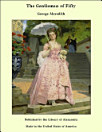Sandra Belloni (Originally Emilia in England) Complete
About this ebook
That the Tinleys really were their match, they acknowledged, upon the admission of the despicable nature of the game. The Tinleys had winged a dreadful shaft at them; not in itself to be dreaded, but that it struck a weak point; it was a common shot that exploded a magazine; and for a time it quite upset their social policy, causing them to act like simple young ladies who feel things and resent them. The ladies of Brookfield had let it be known that, in their privacy together, they were Pole, Polar, and North Pole. Pole, Polar, and North Pole were designations of the three shades of distance which they could convey in a bow: a form of salute they cherished as peculiarly their own; being a method they had invented to rebuke the intrusiveness of the outer world, and hold away all strangers until approved worthy. Even friends had occasionally to submit to it in a softened form. Arabella, the eldest, and Adela, the youngest, alternated Pole and Polar; but North Pole was shared by Cornelia with none. She was the fairest of the three; a nobly-built person; her eyes not vacant of tenderness when she put off her armour. In her war-panoply before unhappy strangers, she was a Britomart. They bowed to an iceberg, which replied to them with the freezing indifference of the floating colossus, when the Winter sun despatches a feeble greeting messenger-beam from his miserable Arctic wallet. The simile must be accepted in its might, for no lesser one will express the scornfulness toward men displayed by this strikingly well-favoured, formal lady, whose heart of hearts demanded for her as spouse, a lord, a philosopher, and a Christian, in one: and he must be a member of Parliament. Hence her isolated air.
Now, when the ladies of Brookfield heard that their Pole, Polar, and North Pole, the splendid image of themselves, had been transformed by the Tinleys, and defiled by them to Pole, Polony, and Maypole, they should have laughed contemptuously; but the terrible nerve of ridicule quivered in witness against them, and was not to be stilled. They could not understand why so coarse a thing should affect them. It stuck in their flesh. It gave them the idea that they saw their features hideous, but real, in a magnifying mirror.
There was therefore a feud between the Tinleys and the Poles; and when Mr. Pericles entirely gave up the former, the latter rewarded him by spreading abroad every possible kind interpretation of his atrocious bad manners. He was a Greek, of Parisian gilding, whose Parisian hat flew off at a moment's notice, and whose savage snarl was heard at the slightest vexation. His talk of renowned prime-donne by their Christian names, and the way that he would catalogue emperors, statesmen, and noblemen known to him, with familiar indifference, as things below the musical Art, gave a distinguishing tone to Brookfield, from which his French accentuation of our tongue did not detract.
Mr. Pericles grimaced bitterly at any claim to excellence being set up for the mysterious voice in the woods. Tapping one forefinger on the uplifted point of the other, he observed that to sing abroad in the night air of an English Spring month was conclusive of imbecility; and that no imbecile sang at all. Because, to sing, involved the highest accomplishment of which the human spirit could boast. Did the ladies see? he asked. They thought they saw that he carried on a deception admirably. In return, they inquired whether he would come with them and hunt the voice, saying that they would catch it for him. "I shall catch a cold for myself," said Mr. Pericles, from the elevation of a shrug, feeling that he was doomed to go forth. He acted reluctance so well that the ladies affected a pretty imperiousness; and when at last he consented to join the party, they thanked him with a nicely simulated warmth, believing that they had pleased him thoroughly.
Their brother Wilfrid was at Brookfield. Six months earlier he had returned from India, an invalided cornet of light cavalry, with a reputation for military dash and the prospect of a medal. Then he was their heroic brother he was now their guard. They love him tenderly, and admired him when it was necessary; but they had exhausted their own sensations concerning his deeds of arms, and fancied that he had served their purpose. And besides, valour is not an intellectual quality, they said. They were ladies so aspiring, these daughters of the merchant Samuel Bolton Pole, that, if Napoleon had been their brother, their imaginations would have overtopped him after his six months' inaction in the Tuileries. They would by that time have made a stepping-stone of the emperor. 'Mounting' was the title given to this proceeding. They went on perpetually mounting. It is still a good way from the head of the tallest of men to the stars; so they had their work before them; but, as they observed, they were young. To be brief, they were very ambitious damsels, aiming at they knew not exactly what, save that it was something so wide that it had not a name, and so high in the air that no one could see it. They knew assuredly that their circle did not please them. So, therefore, they were constantly extending and refining it: extending it perhaps for the purpose of refining it. Their susceptibilities demanded that they should escape from a city circle. Having no mother, they ruled their father's house and him, and were at least commanders of whatsoever forces they could summon for the task.







